
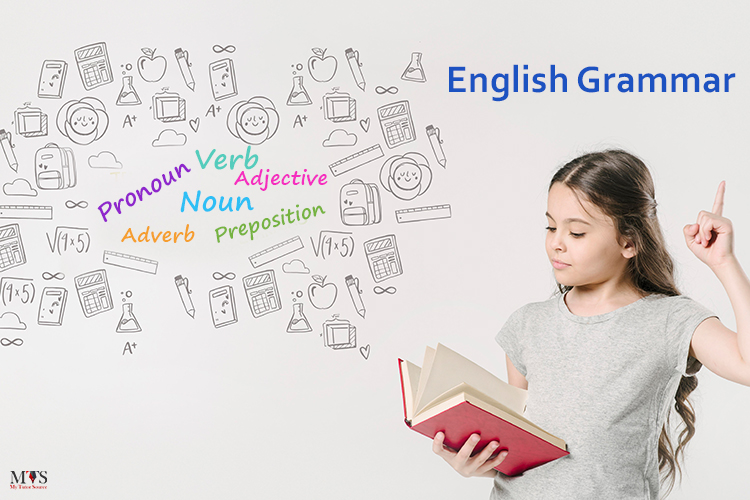
People often find it difficult to learn grammar. Most native learners are not taught grammar in school; they learn how to speak it without learning grammar rules. However, if you plan to learn a language, you start by learning its grammar.
Grammar represents the whole system and structure: syntax and morphology, phonology, and semantics, of a language. Grammar rules are different for different languages, like Mandarin and English; both have different grammar rules.
However, learning grammar is very important, even if you are a native speaker. Even if the grammar is incorrect in spoken language, it is still comprehensible. But in written language, following correct grammar is very important. Wrong grammar can change the meaning of your entire sentence. No matter what you are writing, an essay, assignment, article, or even a social media post, correct grammar can make a lot of difference.
This article will guide you on learning English grammar, so brace yourself and power through the article because I will be sharing some interesting tips to learn and improve your English grammar.
Let me tell you Nate’s story; I know for a fact that most of you will find it highly relatable.
Nate graduated as an accounting major. He was never taught grammar in his higher education and not even in school to his knowledge.
Nate never had to use proper grammar as his field of study and career didn’t require him to be proficient in accounting. However, he got confused between “effect” and “affect” once writing an email. So he asked his friend, a literature major, what’s the difference between these two? His friend replied, one is a verb, and the other is a noun.
A person who wasn’t taught grammar doesn’t know what a verb or noun is, but he still couldn’t figure out the difference. Hence, he decided to learn English grammar, even though he spoke English fluently.
Now how many of you can relate to Nate? If you can, this guide is going to be your savior.
You can easily learn grammar following the given below steps:
Start with parts of speech; it’s a good place to learn grammar. Parts of speech tell us about a word’s role in the sentence.
There are eight parts of speech, their role and examples are as follows:
Noun
A noun is the name of a person, place, or thing.
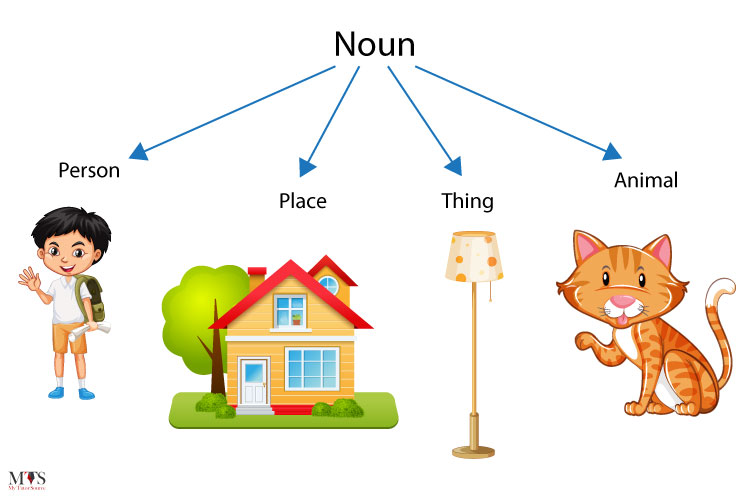
They are further classified as:
Proper Nouns (specific names, e.g., Tom, Yale University, Mount Everest)
Common Nouns (general terms, e.g., Boy, School, Mountain)
Pronoun
Pronouns are words used in place of nouns.
Types of pronouns include:
Personal Pronouns (He, She, It)
Possessive Pronouns (Mine, Hers, His)
Reflexive Pronouns (Myself, Herself, Himself, Itself)
Reciprocal Pronouns (Each other)
Relative Pronouns (that, which, whom, whose)
Demonstrative Pronouns (this, that)
Interrogative Pronouns (who, what, when)
Indefinite Pronouns (anyone, anything, nothing, somebody)
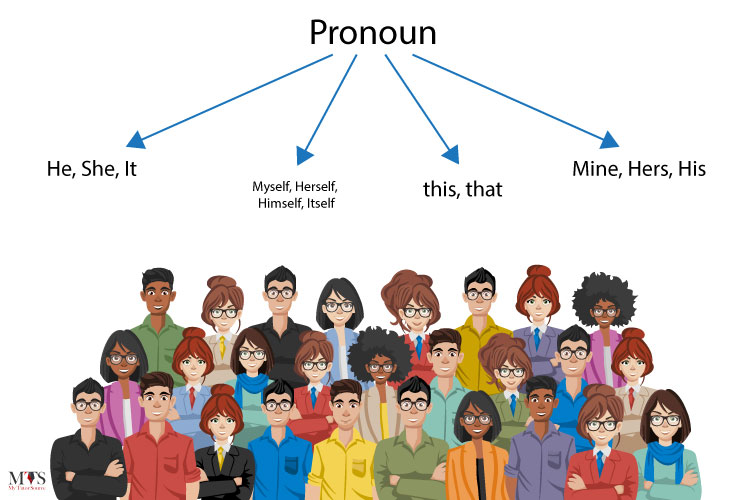
Adjective
Adjectives are used to describe the quality of a noun or pronoun.
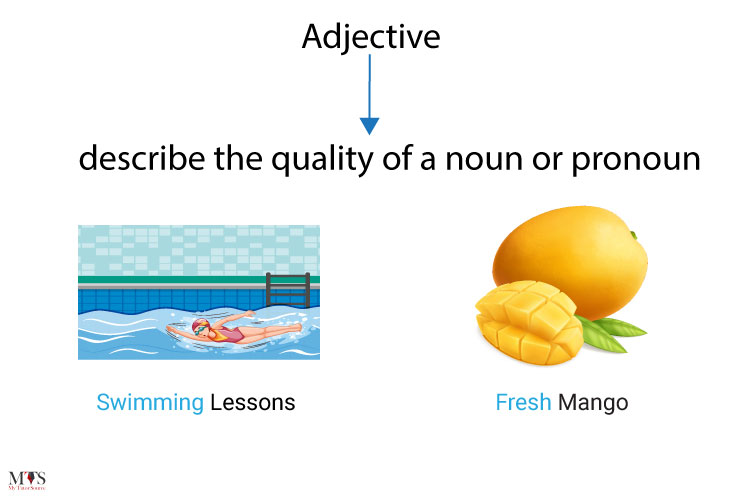
They are further classified as:
Comparative Adjectives (Larger, Greater, Cheaper)
Superlative Adjectives (Largest, Greatest, Cheapest)
Predicate Adjectives (Andrea is tall; Adjective placed away from the noun)
Compound Adjectives (Double-dealing, Happy-go-lucky)
Possessive Adjectives (My, Your, Its, Her, His, Our, Their, and Whose)
Demonstrative Adjectives (This, That, These, and Those)
Proper Adjectives (Russian, Elizabethan, Herculean)
Participial Adjectives (-ed & -ing: Swimming Lessons, Bored Children)
Limiting Adjectives ( These, Your, and Some)
Descriptive Adjectives (Purple Adjective, Friendly Advice, and Attractive Woman)
Interrogative Adjectives (What, Which, and Whose)
Attributive Adjectives (beautiful handwriting, fresh mangoes; Adjectives placed next to the noun.)
Distributive Adjectives (Each, Every, Either, and Neither)
Article
An article is a special adjective used to define a noun as definite or indefinite.

For Example:
The Mount Everest
Not a mountain in sight.
Verb
Verbs are action words.
For Example:
I am working.
She loved gardening.
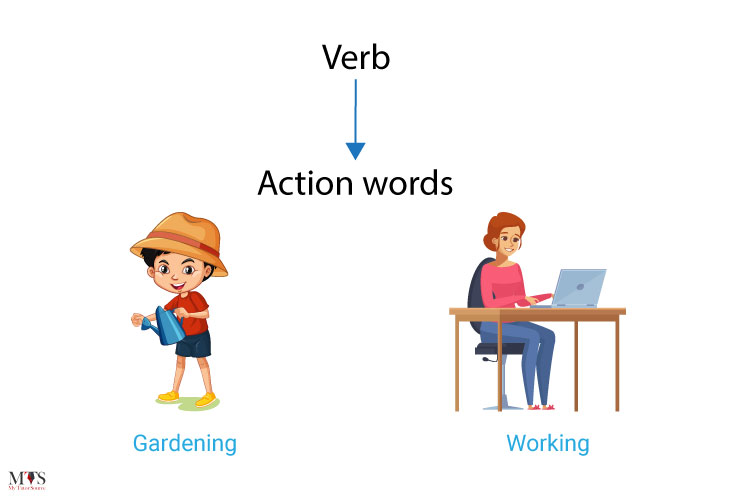
Conjunction
Conjunctions are used to connect two parts of a sentence.
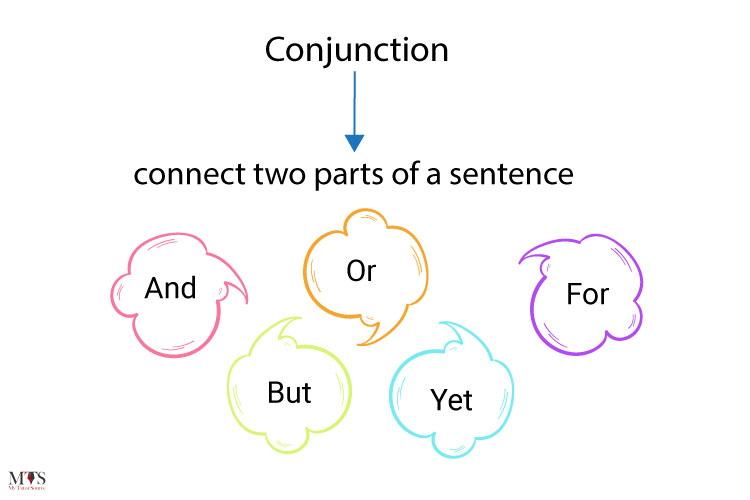
For Example:
I would go to the supermarket, but Sam got the groceries.
I love painting, and I also like to sculpt.
Preposition
Prepositions govern and precede nouns/pronouns to show a connection between words or elements of a clause.
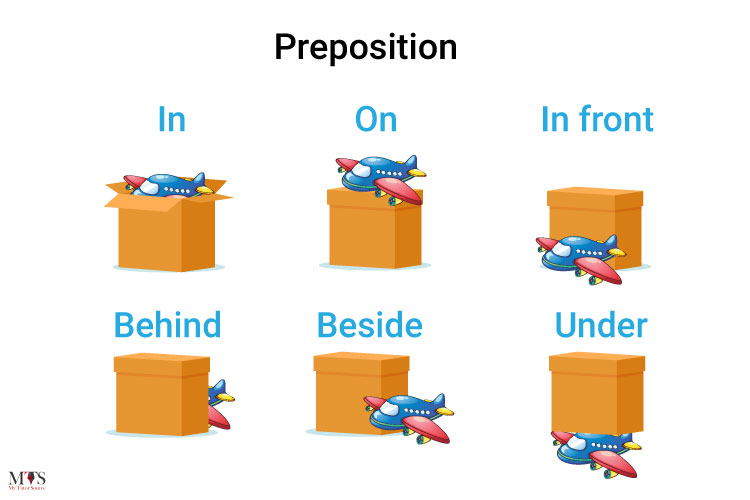
For Example:
I placed the keys on that shelf.
She is headed to work.
Other prepositions include:
| Above | Along | At | Below | Between | From | Near |
| Across | Among | Before | Beneath | By | In | Of |
| Against | Around | Behind | Beside | Down | Into | On |
| To | Off | Toward | Under | Upon | With | Within |
Interjection
Interjections are used to show emotions in text.
For example:
Wow!
Ouch!
Argh!
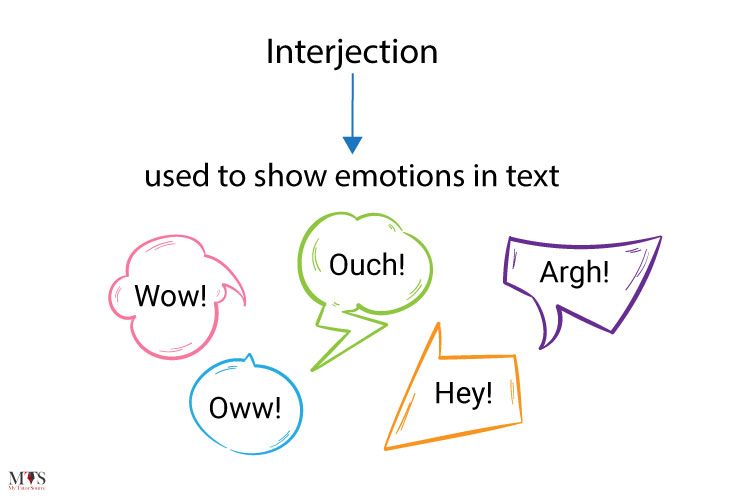
Learning verb tenses can help you improve your grammar. There are three kinds of tenses in any language, “Past,” “Present,” and “Future.”
Past Tense – Used to describe things that happened in the past.
It has further four kinds:
Present Tense – Used to talk about things happening now.
Similarly, it also has further four kinds:
Future Tense – Used to talk about things that would happen in the future.
The four types of future tense include:
If you are learning a foreign language or even improving your English grammar (as a native), familiarize yourself with grammar rules. They will help you improve your writing skills significantly.
Here are the few important rules of grammar that you need to know:
Rule no. 1: A complete sentence must consist of a noun and a verb.
Example: The butterfly flew.
Rule no. 2: A complete sentence must have a subject and a predicate.
Example: The pretty butterfly flew gracefully across the meadow.
Rule no. 3: The above rules can be ignored only in imperative sentences.
Example: Sit down!
Rule no. 4: Adjectives can be placed directly before the noun they describe or after it when separated by a verb.
Example: The vibrant butterfly sat on my hand – The butterfly is vibrant.
Rule no. 5: A compound subject consists of two (or more) simple subjects.
Example: The sparrow and pigeon both flew away.
Rule no. 6: A compound predicate consists of two (or more) predicates.
Example: The bee flew over and pollinated flowers.
Rule no. 7: A compound sentence consists of two or more subjects or predicates.
Example: Tom worked, and Anna studied.
Rule no. 8: Independent clause is formed by the subject and a predicate, just like a complete sentence.
Example: The day halted.
Rule no. 9: Dependent clauses can be complete sentences without additional words.
Example: He came home when the Sun sat.
Rule no. 10: Direct object is the noun being acted on by the verb.
Example: They ate breakfast.
Rule no. 11: The indirect object is the noun that receives the direct object.
Example: The bird gave the seeds to me.
Rule no. 12: In passive voice sentences, the object of the verb becomes the subject of the sentence.
Example: The lion ate the sheep → The sheep was eaten by the lion.
Rule no. 13: Conjugations of the verb “to be” are integral to passive voice.
Example: The flowers are being pollinated by the wind.
Rule no. 14: Passive voice sentences can be written without the subject of the acting verb.
Example: The flowers were pollinated.
Rule no. 15: When using passive voice, the subject of the acting verb can be connected to a prepositional phrase.
Example: The flowers were pollinated in the spring.
Rule no. 16: Use commas to separate prepositional phrases.
Example: The watch, which belonged to my mother, is beautiful.
Rule no. 17: Adverbs can act like prepositions.
Example: The children finish their homework quickly.
Rule no. 18: We can use subject compliment to describe the sentence’s subject.
Example: The watch is silver.
Learn how to use words in sentences. You can do so by practicing sentence formation and completing tasks and exercises available online. Foster the ability to put words together to form complete sentences.
Think about sentence structure, using the rules above, form a sentence diagram in your head, a piece of paper, or your electronic devices. Practice this every day. It will help you write and speak better English in your daily life.
Someone/ Something + Being/ Doing Something.
Clauses and phrases are units of language; groups of words that come together to form a single unit. They can’t stand on their own and require other parts of speech to form a complete sentence.
Learning different phrases and clauses will help you with the formation of proper sentences.
You can also use word diagrams to fit phrases and clauses into sentences, as well take practice exercises available online.
For Example:
Phrase: the boy on the bus
Sentence: The boy on the bus is my schoolmate.
Clause: when you wake up
Sentence: Let me know when you wake up.
Using proper punctuation plays an important role in English Grammar, especially when writing academically. Using wrong punctuation can change the entire meaning of your sentence. So practice proper use of punctuation.
You can also check out our blog on the proper use of punctuation on our blog to further clarify your concepts.
For example:
“Let’s eat, Grandma,” without the comma, would become “Let’s eat Grandma.”
You don’t want to eat her, now do you?
Similarly, “Eat your dinner!”, if punctuated wrong, could become; “Eat. You’re Dinner.” and you don’t want to tell someone they are dinner unless it’s a chicken.
Follow the tips given below to improve your grammar!
Learn as many words as you can! It’s the best thing you can do to improve your grammar. Get a dictionary or download one online, and start learning a few words every day. Make a list of these words with meanings, see how to use them in sentences. Once you do that, try incorporating them into your everyday life.

You can’t improve your language skills until you speak to people in real life. The more you interact and talk with people, the more it will help you learn correct grammar. Listening to people can help you with learning grammar.

You can learn English Grammar by watching movies and TV shows. It’s a great way to watch, listen, practise, and learn. You won’t even get bored. Here are a few recommendations of movies/shows that can help you improve your speaking skills.
Pro Tip: Don’t forget to turn on the captions.
You learn from your mistakes! Ask for corrections, seek guidance from people who are good with grammar. It’s the best way to learn and remember. As they say, only a fool makes the same mistake twice. Don’t be one. Making a mistake is not an issue; repeating one is. So always seek corrections!
Always go through your edited/proofread work, and match it with the original draft so you can see and remember your mistakes.
English grammar contains lots of patterns; pay attention to them. So the next time you write a sentence, try to implement those learned patterns without looking at your grammar rules. Adopt this habit, and it will work wonders to improve your English grammar.
There’s an app for learning almost anything. Raid your app stores to find a suitable app to help you learn and improve your grammar skills. You can easily download them. Moreover, they are easy to use and convenient, as you can use them from the comfort of your own home. If you pick the right app, they will step-by-step teach you how to learn grammar.
A few apps that we recommend you to have on your phone are:
By following our step-by-step guide and tips on how to learn English grammar, you can start drafting your study plan, or you can hire an expert online tutor.
Learning English grammar might seem like a taxing and boring task, but when done correctly can be very fun and informative.
If you are looking for additional help, you can contact our expert tutors at MTS. Our English tutors will help you learn grammar from scratch, take you through all the steps one-by-one, and give you fun tasks and assignments to effectively teach you the use of English grammar.